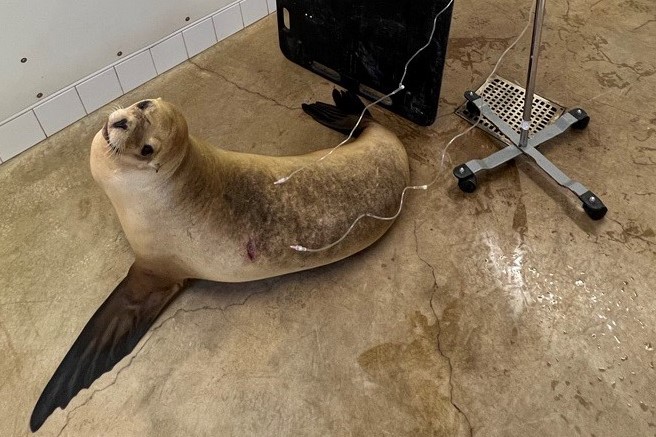In June and July 2023, hundreds of sea lions in Orange County were found sick with domoic acid poisoning. The Pacific Marine Mammal Center (PMMC) in Laguna Beach, California, was overwhelmed with patients and called for assistance from zoos and aquariums. Two staff members from the Minnesota Zoo, Nicole Williamson and Miranda Bovy, traveled to California to provide care for the sea lions. They worked long shifts, feeding the sea lions fresh fish and administering fluids and medication. Despite the challenges of working with wild sea lions, they were able to make a difference and assist with the release of rehabilitated sea lions. The PMMC reported that over 65% of the rescued sea lions were saved, and they expressed gratitude for the support from zoos, aquariums, and stranding network partners. The Minnesota Zoo is committed to partnering with other facilities to better understand and resolve threats to marine mammals.
A deeper understanding of marine mammal health and conservation efforts, which ultimately benefits the entire population and ecosystem,” Heizmann says. “By working together, we can significantly protect these amazing animals for generations to come.”
The Minnesota Zoo Flippered Friends in Need program is just one example of how zoos and aquariums play a crucial role in wildlife conservation and rehabilitation. Through partnerships with organizations like the Pacific Marine Mammal Center, these facilities can provide specialized care and support during times of crisis.
The recent influx of sick sea lions affected by domoic acid poisoning in California is a prime example of the challenges marine mammal rehabilitation centers face. Domoic acid, a neurotoxin produced by marine algae, can accumulate in the bodies of sea lions and cause critical illness, seizures, and even death. With no cure for the condition, supportive care and treatment are essential for these animals’ survival.
In the case of the Minnesota Zoo Flippered Friends in Need program, aquarists like Nicole Williamson and animal care technicians like Miranda Bovy were deployed to the Pacific Marine Mammal Center to assist with the care of the sick sea lions. With their expertise in pinniped care, they were able to provide much-needed support during this crisis.
The work carried out by Nicole and Miranda during their time at the Pacific Marine Mammal Center was both physically demanding and emotionally challenging. Long shifts, hot weather, and the constant worry for the well-being of the sea lions made for an intense experience. However, their dedication and commitment to the animals were evident. They prepped fresh fish, fed the sea lions, monitored their health, and ensured their safety and comfort throughout rehabilitation.
Nicole and Miranda’s efforts and those of their colleagues and partners paid off. Over 65% of the rescued sea lions could be saved and returned to the wild. This success can be attributed to the collaborative efforts of zoos, aquariums, and rehabilitation centers, all working together to provide the necessary care and support for these animals.
The Minnesota Zoo’s involvement in the Flippered Friends in Need program highlights its commitment to wildlife conservation and demonstrates the importance of partnerships in times of crisis. By sharing their expertise and resources, zoos can significantly impact the well-being and recovery of vulnerable species.
The experience gained by Nicole and Miranda during their time at the Pacific Marine Mammal Center will undoubtedly benefit the Minnesota Zoo and its ongoing conservation efforts. Their hands-on work and interactions with the sea lions gave them valuable knowledge and insights into marine mammal health and rehabilitation. This knowledge can be applied to the care and preservation of other marine species at the zoo and contribute to broader research and conservation initiatives.
In conclusion, the Minnesota Zoo Flippered Friends in Need program and the involvement of aquarists like Nicole Williamson and animal care technicians like Miranda Bovy demonstrate the vital role that zoos and aquariums play in wildlife conservation and rehabilitation. Through partnerships and collaborative efforts, these facilities can provide the specialized care and support needed during times of crisis, ultimately significantly protecting and preserving endangered and vulnerable species.


